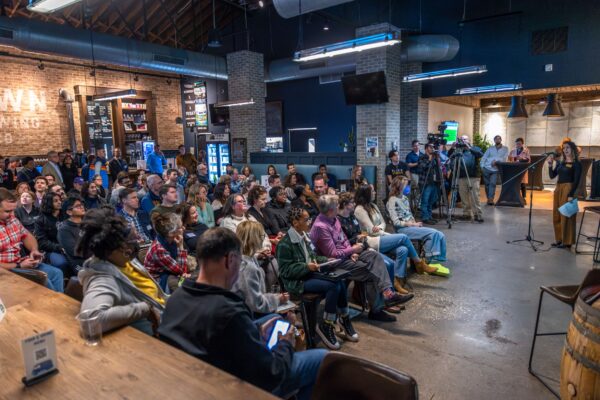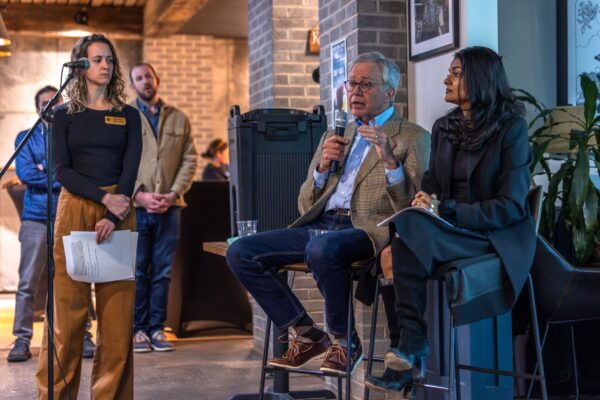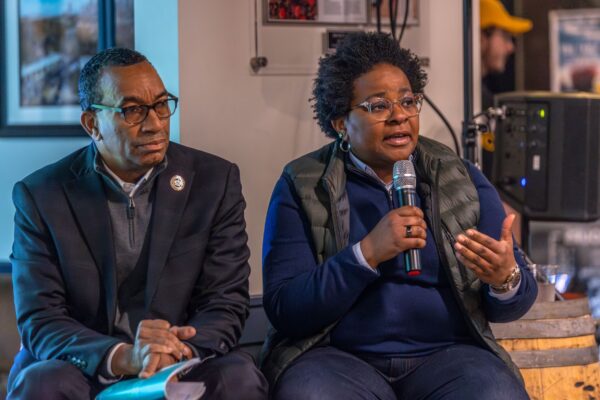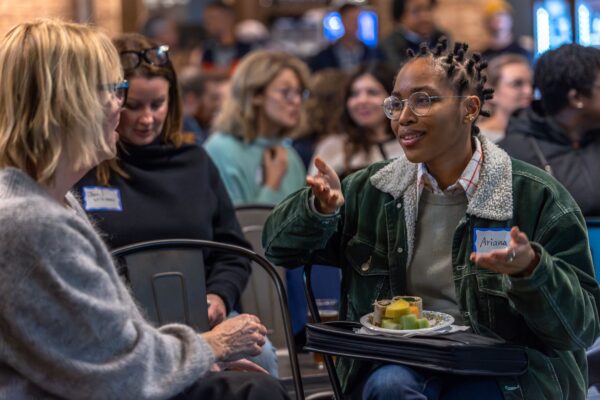Sustain Charlotte Social: Social Equity and Smart Growth (January 31, 2024)

More than 100 residents gathered for our first Sustain Charlotte Social of the year. (Photo: Grant Baldwin Photography)
It was a full house at Town Brewing Co. on Wednesday as more than 100 energetic, engaged residents joined our first Sustain Charlotte Social of the year. This event, which focused on social equity and smart growth, began with refreshments and time for networking among sustainability-minded friends.
Following a brief presentation regarding Charlotte’s growth and factors contributing to inequities in the Charlotte area, Charlotte City Council members Ed Driggs, Dimple Ajmera, James Mitchell and Mayor Pro Tem Dante Anderson participated in a panel discussion and Q&A with event participants.
Here are the questions the panelists were asked and their answers (lightly edited for clarity and brevity):

Charlotte Council members Driggs and Ajmera participate in the Q&A. (Photo: Grant Baldwin Photography)
Question: As we can see from the Comprehensive Plan’s accompanying Equity Atlas, many of Charlotte’s residents still bear a much larger share of the burden of past inequitable decisions and lack of investments in Charlotte’s built environment. One of the overarching goals of the Comp Plan is to help Charlotte grow more equitably. What do you see as the solution(s) to growing in a more equitable way?
Council Member Driggs: “We are working against history and market forces and we’re trying to use the resources available to city council to change direction. We have limited resources, but our plan embodies diversifying housing types, among many other things.”
Council Member Ajmera: “Council adopted the UDO in 2022 and it became enacted last year, but there is still work to do. In order to grow equitably, we need to be intentional about our investments to undo harm created over decades.”
Mayor Pro Tem Anderson: “The very first thing we need to do is acknowledge that inequities have happened – things like how neighborhoods like Cherry and Chantilly were bifurcated by the establishment of Independence Blvd. We must acknowledge what has occurred and then act. The UDO is a great tool, but we can’t rely on it alone. We have Corridors of Opportunity where there has historically been disinvestment. This is a fantastic example of how we can be strategic in increasing investments in these areas as a matter of practice. We must ensure that we develop policy moving forward through an equity lens.”
Council Member Mitchell: “We have to continue to make sure to allow affordable housing to be developed throughout the city. This is a city issue. We need to make sure our policies recognize affordable housing and make it a part of mixed-use developments. I also want to make sure all small businesses have the opportunity to participate in our growth.”

Council member Mitchell and Mayor Pro Tem Anderson participate in the Q&A. (Photo: Grant Baldwin Photography)
Question: Council adopted the Comprehensive Plan to set a vision for equitable growth and then adopted new development regulations as the primary implementation tool. From your perspective, what is Council’s role in ensuring that the 2040 Comprehensive Plan and Unified Development Ordinance (UDO) help Charlotte grow equitably? What are you personally committed to doing during your time on Council to help with their equitable implementation?
Council Member Ajmera: I’m committed to no community being left behind. We need to seek very measurable outcomes, focus on measurable results, like rezoning projects, developments that commit to affordable housing, and honoring our commitment to transit access.”
Council Member Mitchell: “We need to make sure there are no unforeseen consequences of the UDO. It’s a guide, and we need to provide consistent leadership.”
Mayor Pro Tem Anderson: “We can show up and be prepared. We need to do our homework and understand what’s in each zoning petition, go out to sites as needed, hold every council member accountable for doing their homework. The UDO is a living document. There was a lot of work to get it where it is, but it’s not perfect. It’s still open to feedback, reevaluation and changes. We want to make sure the community has a voice.”
Council Member Driggs: “I’m in agreement about the goals of the UDO. I voted against it because of concerns about unintended consequences of well-intentioned policies, but now my work is to set out to do what the UDO was created to accomplish.”

Participants enjoyed time for networking and discussion before and after the panel. (Photo: Grant Baldwin)
Question: City Council adopted a new Strategic Mobility Plan in 2022 and has identified a long list of projects that will provide more affordable transportation choices for those who cannot afford a car, operate a car due to age or disability or simply choose not to drive. Yet the funding required to implement this plan far exceeds current funding available. Every year since 2021, the City has talked about the need for a sales tax increase to provide the needed funding but every year it’s been postponed until the next year. In fact, last week at your budget retreat we learned that the tax won’t be on the ballot in 2024 and now it will be 2025 at the earliest. Given the long overdue and urgent need for investment in a more diverse and affordable transportation system, what will you do to move the sales tax effort forward this year? What can residents do to help support Council in this effort?
Council Member Driggs: “The city created a plan that was informed socially and adopts best principles, but as we went to implement the plan, we learned that in order to get support from Raleigh and Washington, we need to have a regional agreement. We began working with Centralina and Connect Beyond and realized that there is some discord among the planning contingent resulting from the Red Line plan. I travel to Raleigh to try to help our lawmakers understand that Mecklenburg is important to North Carolina and mobility is important to Mecklenburg. We’re also engaging members of the business community so that legislators hear about the economic impact of transportation, too.”
Mayor Pro Tem Anderson: “We need to focus on telling our story, getting the plan correct, and getting authority to put it on the ballot. And then educate the public to get engaged. We need to tell the economic benefit story so that folks will vote for the new tax when the time comes. It may feel like we are not succeeding or making traction, but it’s a tough challenge. I applaud the plan we’ve created. We have to find the dollars but can’t wait on that to strategically move this forward. Work will be done while we prepare to get this on the ballot.”
Council Member Mitchell: “We have to act now. We must have a vision. We’re not sitting around waiting. We understand growth. We need your help. We understand what city we would like to become. We want you to engage with us to make sure we do it right and make sure we’re doing it now. Charlotte is moving in the right direction – now we need to prepare to make sure we do it right.”
Council Member Ajmera: “Transportation is critical to upward mobility, especially when we’re tackling poverty. Our mobility investments have not kept up with our growth, but we are doing a lot more behind the scenes that often gets overlooked. We have a plan that many other cities do not. We must have a strategy in place to build consensus and deliver on promises to northern Mecklenburg County towns. I encourage residents to come out to public forums and budget discussions because that’s where the rubber meets the road, that’s where we make investment and infrastructure decisions.”
Thank you to everyone who joined us for this important event. If you missed it or want to revisit some of the discussion, you can watch a replay here. And make plans now to attend our next Sustain Charlotte Social on March 27! Tickets will be available soon here.
THANKS FOR READING!
As a nonprofit, community support is essential for us to keep doing what we do — including providing free articles like this. If you found this article helpful, please consider supporting Sustain Charlotte.
Want to stay in the loop? Subscribe to our weekly newsletter and follow us on Instagram, Facebook, and Twitter.
